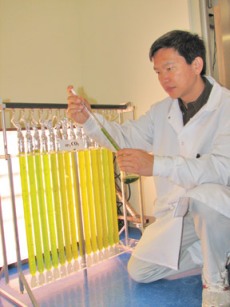 Electricity from solar power stations located in desert areas and biofuels produced from algae could play key roles in reducing the climate impact of cars, ships, trains and planes, said Dr. Nasir El Bassam, an expert in clean transportation who was speaking at the inaugural World Future Energy Summit, a forum for exchange and discussion on the technologies and strategies needed to mitigate the climate impacts of transportation. The event that ended on Wednesday took place in Abu Dhabi. The city in the United Arab Emirates recently launched the Masdar Initiative in a bid to become a hub for new energy technologies.
Electricity from solar power stations located in desert areas and biofuels produced from algae could play key roles in reducing the climate impact of cars, ships, trains and planes, said Dr. Nasir El Bassam, an expert in clean transportation who was speaking at the inaugural World Future Energy Summit, a forum for exchange and discussion on the technologies and strategies needed to mitigate the climate impacts of transportation. The event that ended on Wednesday took place in Abu Dhabi. The city in the United Arab Emirates recently launched the Masdar Initiative in a bid to become a hub for new energy technologies.
Professor El Bassam, Director of the International Research Centre for Renewable Energy (IFEED), said that recent studies published by the German government had concluded that solar power generated in just 1-2% of the world’s desert areas could eventually provide all the electricity the world needed. This would include the electricity required for clean – zero-carbon – transportation as improvements in electric vehicle technology encourage people to switch from gasoline and diesel.
With the number of vehicles in the world projected to rise from 700 million today to over 2 billion by 2050, efforts are intensifying to find ways to meet this fast-growing demand while at the same time minimising the sector’s greenhouse gas emissions. Specifically, said Professor El Bassam, the Bali climate change talks suggested that carbon dioxide (CO2) emissions should be reduced by half by 2050.
During the event, it was also said that in less than a decade since the Kyoto Protocol was adopted, renewable energy has evolved rapidly from an ‘alternative’ source of energy to a mainstream energy option, according to the REN21 Renewables Global Status Report 2007.
Compared to a total global power capacity of 4,300 GW, the report finds renewable energy (without large hydro) now provides about 240 Gigawatts (GW) of clean power, avoiding some 5 gigatonnes per year (Gt/year) of carbon emissions.
“What’s needed now are binding targets in an international agreement to establish polices that can rapidly accelerate the large-scale deployment of renewable energy to replace fossil fuels,†said Mohamed El-Ashry, head of the global policy network REN21 that produced the report with the Worldwatch Institute.





